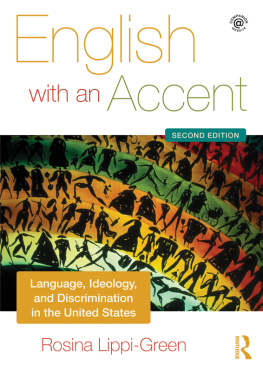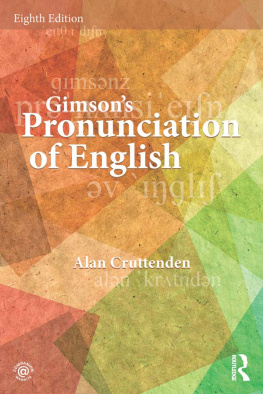English with an Accent
Since its initial publication, English with an Accent has provoked debate and controversy within classrooms through its in-depth scrutiny of American attitudes toward language. Rosina Lippi-Green discusses the ways in which discrimination based on accent functions to support and perpetuate social structures and unequal power relations.
This second edition has been reorganized and revised to include:
 new dedicated chapters on Latino English and Asian American English
new dedicated chapters on Latino English and Asian American English discussion questions, further reading, and suggested classroom exercises
discussion questions, further reading, and suggested classroom exercises updated examples from the classroom, the judicial system, the media, and corporate culture
updated examples from the classroom, the judicial system, the media, and corporate culture a discussion of the long-term implications of the Ebonics debate
a discussion of the long-term implications of the Ebonics debate a brand-new companion website with an interactive bibliography, glossary of key terms, and links to audio, video, and images relevant to each chapters content, available at: www.routledge.com/cw/lippi-green.
a brand-new companion website with an interactive bibliography, glossary of key terms, and links to audio, video, and images relevant to each chapters content, available at: www.routledge.com/cw/lippi-green.
English with an Accent is essential reading for students with interests in attitudes and discrimination toward language.
Rosina Lippi-Green is an independent scholar and award-winning writer of fiction. She holds a PhD in linguistics from Princeton University, USA, and was a University of Michigan, Ann Arbor faculty member for ten years.
This second edition of English with an Accent exceeds the high standard of research excellence that Lippi-Green first displayed in 1997. This new book introduces keen insights about language, justice, discrimination, and the human condition in America.
John Baugh, Margaret Bush Wilson Professor in Arts and Sciences, Washington University in St. Louis, USA
English with an Accent, a powerfully penned exposition on the relation between language, subordination, and discrimination, was already insightful and thought-provoking when it first appeared in 1997. This updated and expanded second edition has made it absolutely invaluable, and I cant wait to use it in my classes. It represents sociolinguistics at its best theoretically informed, but decidedly applied as well, implicating race relations, immigration, social class, education, politics, immigration, and more. It is impossible to read this book and not be troubled by prejudices and practices that we didnt notice or consider problematic before.
John R. Rickford, J.E. Wallace Sterling Professor of Linguistics and the Humanities, Stanford University, USA
This new edition breaks new ground again, providing updates related to politics, internet usage, and the classroom... It will be the go-to text for explorations of language and its connection to social identity, linguistic authority, and language-based oppression. I cant wait to use it in my courses.
Robin Queen, Arthur F. Thurnau Professor, University of Michigan, USA
English with an Accent is an encyclopedic, cutting-edge update of Lippi-Greens classic text on language subordination. Hard-hitting and thought-provoking, this is an essential work.
Jane H. Hill, Regents Professor of Anthropology and Linguistics (Emerita), University of Arizona, USA
English with an Accent
Language, ideology, and discrimination in the United States
Second Edition
Rosina Lippi-Green

This second edition published 2012
by Routledge
2 Park Square, Milton Park, Abingdon, Oxon OX14 4RN
Simultaneously published in the USA and Canada
by Routledge
711 Third Avenue, New York, NY 10017
Routledge is an imprint of the Taylor & Francis Group, an informa business
1997, 2012 Rosina Lippi-Green
The right of Rosina Lippi-Green to be identified as author of this work has been asserted by her in accordance with sections 77 and 78 of the Copyright, Designs and Patents Act 1988.
All rights reserved. No part of this book may be reprinted or reproduced or utilized in any form or by any electronic, mechanical, or other means, now known or hereafter invented, including photocopying and recording, or in any information storage or retrieval system, without permission in writing from the publishers.
Trademark Notice: Product or corporate names may be trademarks or registered trademarks, and are used only for identification and explanation without intent to infringe.
First edition published by Routledge 1997
British Library Cataloguing in Publication Data
A catalogue record for this book is available from the British Library
Library of Congress Cataloging-in-Publication Data
Lippi-Green, Rosina.
English with an accent: language, ideology and discrimination in the United States / Rosina Lippi-Green. 2nd ed.
p. cm.
Includes bibliographical references and index.
English languageSocial aspectsUnited States. 2. English languagePolitical aspectsUnited States. 3. English languageVariationUnited States. 4. Speech and social statusUnited States. 5. Language and cultureUnited States. 6. Language policyUnited States. 7. DiscriminationUnited States. I. Title.
PE2808.8.L57 2011
306.440973dc23
2011024009
ISBN: 9780415559102 (hbk)
ISBN: 9780415559119 (pbk)
ISBN: 9780203348802 (ebk)
In memory of my father, Arturo Lippi, 19111985 who had an accent I couldnt hear
Contents
The glossary and an extended bibliography with further reading can be found at www.routledge.com/cw/lippi-green.
List of figures
List of tables
Everyone is entitled to their own opinion, but not to their own facts.
Daniel Patrick Moynihan
By almost anybodys modern U.S. standards, I have no accent. Because of the English I speak, the destructive and exclusionary practices you will read about in this book have never been directed at me.
But of course, I do have an accent. My English tells anybody who wants to listen to me who I am: a woman of European ancestry, middle-aged, who has lived most of her life in the heart of the country, in the Midwest. By fortunate circumstance, I had a longer and more exclusive education than most people have, which has also influenced my accent because it took me away from the Midwest, primarily, but also because it put me in social circumstances which were foreign to me, against which I struggled and will always struggle, even as I adjust.
This is a written work, and so it is not by virtue of my accent but of my education that I am granted a voice. For that reason some would say that my authority derives exclusively from privilege. It is true that I cannot claim the authority of personal experience in the matters I am going to describe and discuss except in the most trivial way but I can and do claim the authority of careful observation and study, and of interest and participation.
I am taking a chance. My thoughts may be dismissed, my observations put aside. In a time when authorial voices are questioned very closely, I have no credentials which allow me to speak nor do I wish to speak for African Americans or Asian Americans. Because I am not a Latina or Lakota Sioux, because I am not from Mobile, the Bronx, Bombay, Singapore, or Nairobi, readers may question my data before ever considering my analysis and conclusions. In that case, I invite them to investigate for themselves before dismissing what I have to say. The purpose of this study is not to answer the questions raised in a definitive way, but to open up a discussion and examination which has been suppressed for too long.
Next page













 new dedicated chapters on Latino English and Asian American English
new dedicated chapters on Latino English and Asian American English